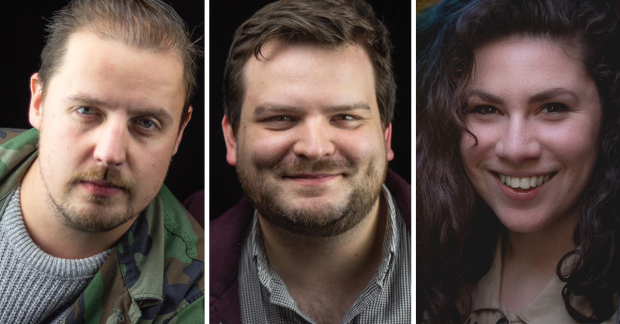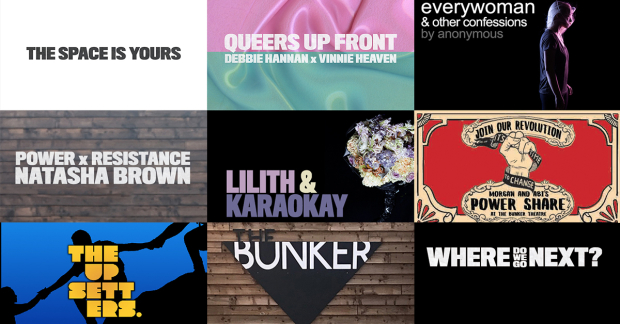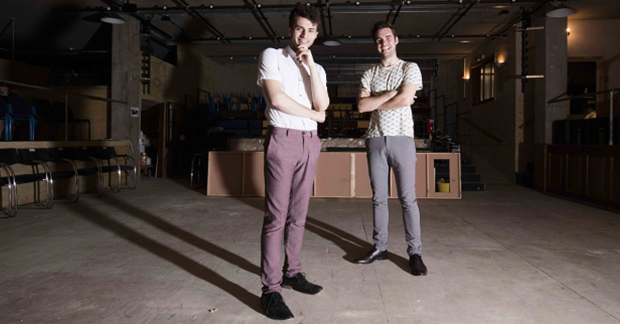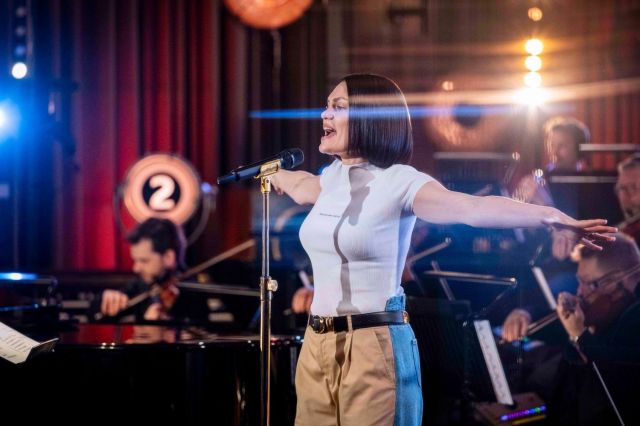Chris Sonnex, David Ralf and Hannah Roza Fisher: the Bunker Theatre, its legacy and its future
The team discuss the impact of the south London venue before it closes its doors this spring

"I don't think the Bunker is going to be off of people's lips for some time".
Artistic director Chris Sonnex isn't wrong. In its too short tenure of three years occupying a converted underground car park in Southwark below the Menier Chocolate Factory, the Bunker Theatre has championed new writing and artists from a diverse series of backgrounds and with a wide range of artistic viewpoints. It even recently won Fringe Theatre of the Year at The Stage Awards 2020. But now, due to a proposed redevelopment occurring on the south London site, this Off-West End venue will close its doors on 28 March after an eight-week takeover season that begins today – over 80 artists will be featured as a different friend of the venue curates everything in each week, from the programming to the bar.
It's this kind of progressive, rule-breaking attitude that has been at the core of the Bunker since 2016. The venue opened with Isley Lynn's Skin A Cat and has played host to such creatives as the Traverse Theatre's new co-artistic director Debbie Hannan, director Sara Joyce (Dust), theatre companies Cardboard Citizens and Damsel Productions, and actors Danny-Boy Hatchard (Eyes Closed, Ears Covered) and Daniella Isaacs (Devil with the Blue Dress). Some of WhatsOnStage's theatre professionals to look out for in 2020 – lighting designer Zoe Spurr and sound designer Nicola Chang among them – have also worked in this welcoming, inviting and transformative space.
We spoke with Sonnex, executive director David Ralf and head of production Hannah Roza Fisher about the closing of the current venue, its legacy, the final season and a potential future elsewhere.
What were you all feeling when you had to let the world know that the Bunker was closing?
Hannah: "It's the kind of thing that we always knew 'could' happen – the reality of being in an area that is rapidly developing into other things and being in a building that does not want to be a theatre meant that things didn't quite look as bright."
David: "We had time to see the writing on the wall, as a team discuss how to share the news and put out a final season that would sum up all the support we've given to artists and producers over the last few years. It rapidly became clear that we wanted to have as many different artists in the building as possible, which led to the idea of the takeover season."
Chris: "We've got Debbie Hannan and Vinnie Heaven, The Upsetters – [artistic director] Marcus Bernard is the first man that I've actually programmed directly – Natasha Brown, Sabrina Mahfouz, Morgan Lloyd Malcolm and Abi Zakarian, the anonymous EVERYWOMAN and Caitriona Shoobridge.
"What we do best is hold artists and allow them to take risks, to be themselves. It's very rare for somebody to turn around and go, 'Do whatever you want'. I've done whatever I wanted for a year and a bit, so I felt it was best for us to allow these people to own the space and see what they can do. There's no fail here – it's nice to experiment with form."

© The Bunker Theatre
In 2019, 86 per cent of writers and 90 per cent of directors working at the Bunker identified as womxn – it's obvious that championing underrepresented voices is a core value for you.
Chris: "If I didn't do that then I wouldn't be doing this – what's the point? White, cis, heterosexual, middle class men aren't going anywhere unfortunately. And that's fine – they can have their space too. But it's boring.
"There aren't many working class artistic directors, directors or artists because you cannot afford to do it – when this ends there's a strong possibility that I could be working in Tesco, or painting and decorating. So, if you're risking all that and still not getting any chances, what's the point of a civic space?
"I never set out by the way to programme all women – I programme the best work. It just so happens that womxn are bringing the best work."
Hannah: "I've been really lucky in this space to almost consistently be in a room that's majority female or non-binary – I'm not surprised to be surrounded by this talent. It's very easy to forget that outside of these walls that it's not the same way, because I look at all the amazing talent that we've got and wonder, 'Why aren't you everywhere?
"It was interesting as well for me being in charge in a technical area as a woman, which is on the face of it very male-heavy. I know so many incredible female and non-binary technicians, stage managers, production managers and designers. But it's still seen as a boy's job."

© Chris Gorman
As a new writing venue, what do you think is needed to bridge the gap that is preventing new, emerging writers from getting into mid-scale or larger venues with more expansive work?
Chris: "It's always producers, those that make this shit work. Then after that it's stage managers."
Hannah: "Anyone can put on a play – you can paint some chairs red, get a black box studio, pay £150 for a night and put on something with your friend doing the stage management, running the tech and this and that. But that gap upwards is f**king huge. It's about building that team who can do it – the producer brings all that together. And pays people! It's that jump."
It's obvious that the Bunker is more than its four walls as a converted underground car park. It's open doors and connections, people and family, making theatre and making mistakes, and chatting and exploring. Is that the future of the Bunker?
Chris: "London needs the theatres that exist to be better. If we can be part of that change, if our artists are going on to bigger and better things – which they are – then we've done our job right.
"It's also an ideology. I am overtly political, that means that the Bunker is overtly political. It's about that openness of saying this is what we believe and think. Politics with a big P but also politics with a small p."
Hannah: "The point of theatre is meant to be the art.
"If we can be a vague idea that you can programme womxn, queer people and black voices, that you can put on a show in a week and it be brilliant, that you can create a producer model, then it proves that people should be doing it elsewhere as well. It's not that hard to make it happen."
David: "If you think about the end of the Bunker here on the 28 March – those takeover weeks – we've got artists and producers that we want to give a package of support to, people who will have explored this space as a civic space, who can take that to the next place they work and be insurgent within that organisation.
"I joined the Bunker at a time when one of the original directors was stepping away, so to see that period of transition through has been extraordinary. We are coming to the end but there's a sense of learning what it takes to move past that first flush of youth."




















